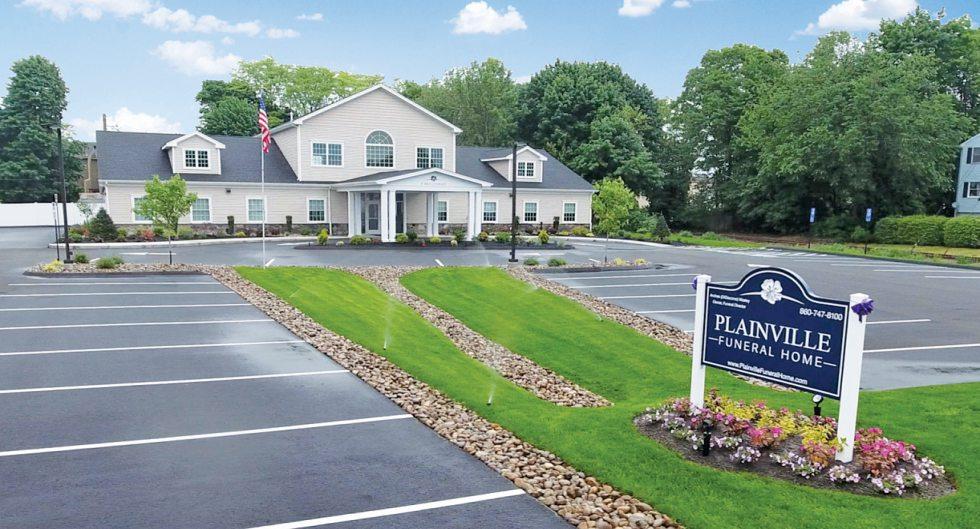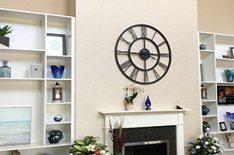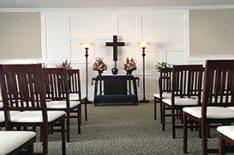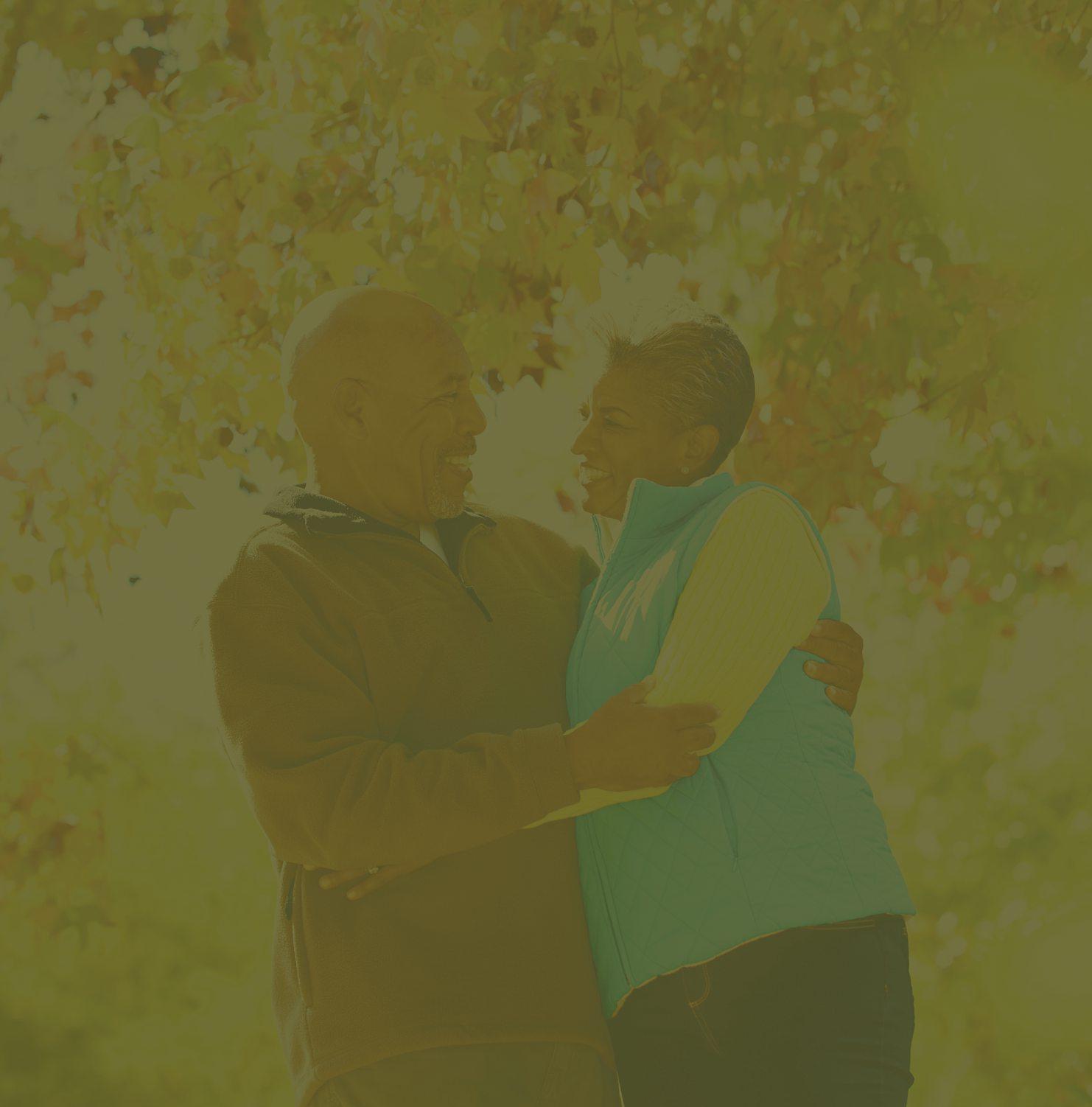
OCTOBER2025










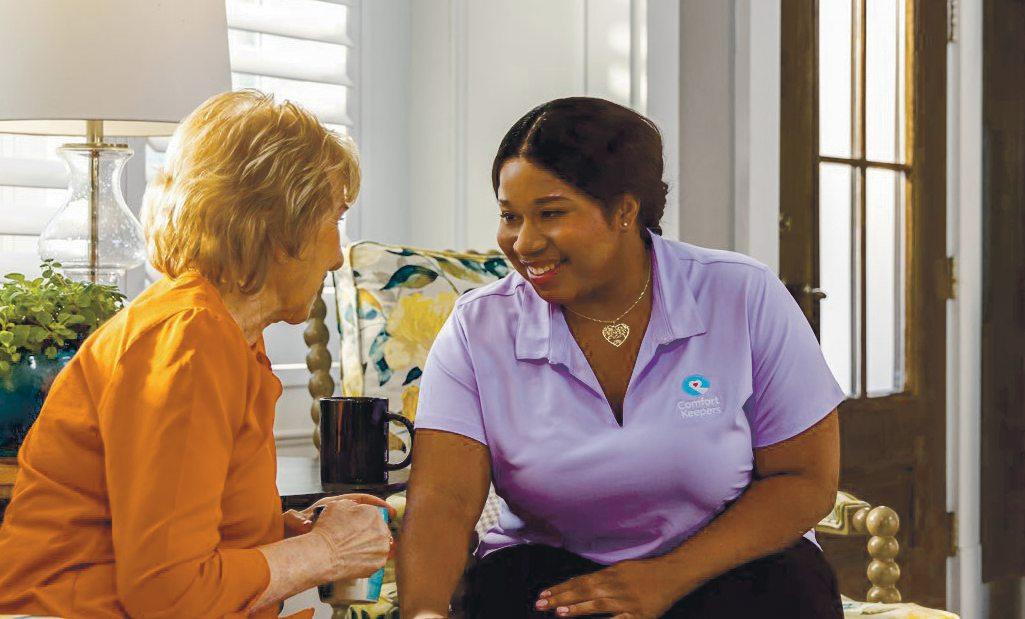


BY BRANDPOINT
Did youknownearly1in4
American adults is afamily caregiver? Andaccordingtoa new study from theNationalAlliancefor Caregivingand AARP,one-third ofall caregivers arealsomembers of the “sandwichgeneration” -caring for an adultand achild under 18 at the same time.Familycaregivers provide help with dailyactivities, transportation, advocating during medical appointments, companionshipand much more.
Especially forthose caring foraparentwithdementia or Alzheimer’s, thechallengesare great- as arethe rewards. ArecentNationalDay of JoysurveybyTalker ResearchonbehalfofComfort Keepers, market-leading providerofin-home care foradults, revealsnearly3in4 caregivers (74%) find theroletobeone of themostrewardingoftheir lives, andnearlyall (91%)say it deepens theirbonds with theseniorintheir care.
“Caregivingfor an olderloved oneisarolemostofus willplay, andthe connection youmakewithyourloved onecan be incredibly meaningful,” said Sherri Snelling, gerontologistand ComfortKeepers spokesperson.“The keyistoremembertocarefor yourself,and focusonthe joyful moments.”
To help providecarefor your lovedone with compassion andresilience, keep theseapproachesinmind.
Gifts from friends and loved ones can make people feel cherished and valued When these people are the older adults in one’s life, such as parents or grandparents, gifts take on additional meaning because they can warm the hearts of very special people
Finding unique gifts for seniors can be challenging because these individuals have been receiving gifts for many years, and many may already have everything they need. Inspiration is everything when shopping for the ideal gifts for the older adults in one’s life, and the following are some categories that can serve as a springboard for what to get seniors this holiday season
COMFORT AND MOBILITY
Although people like to say, “age is just a number,” getting older may come with a few aches and pains and even
some limitations. Gifts like seat cushions that correct posture or easy on/off sock helpers can be helpful. Cloud foam slippers or even a grab bar that attaches into the hood of the car door can be great gifts.
FITNESS AND FUN
Gifts that cater to interests, well-being and more can be ideal. Active seniors may appreciate a fitness tracker or exercise equipment (yoga mat, light dumbbells, resistance bands) to facilitate fitness goals. Storage solutions for hobbies and craft items also can be fitting. See-through containers to store paints or beads or an organizer for fishing tackle can make seniors’ hobbies even more enjoyable. A roll-up puzzle mat is great for puzzle enthusiasts to protect their work until completion.
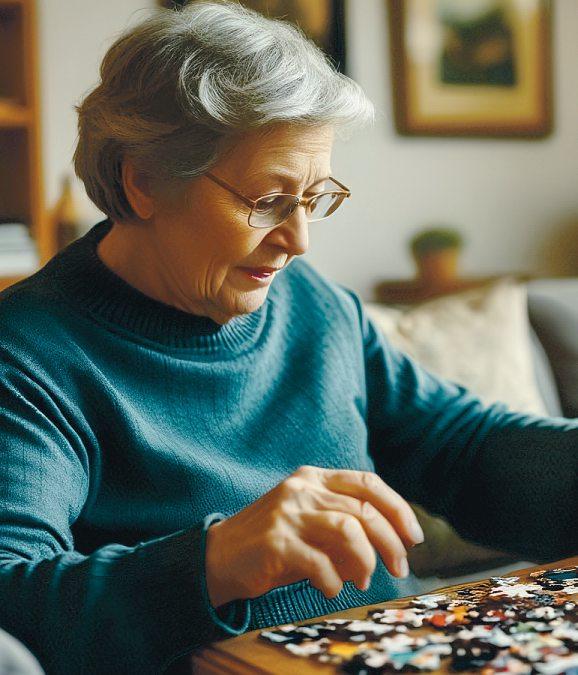
SEE GIFTS PAGE 7

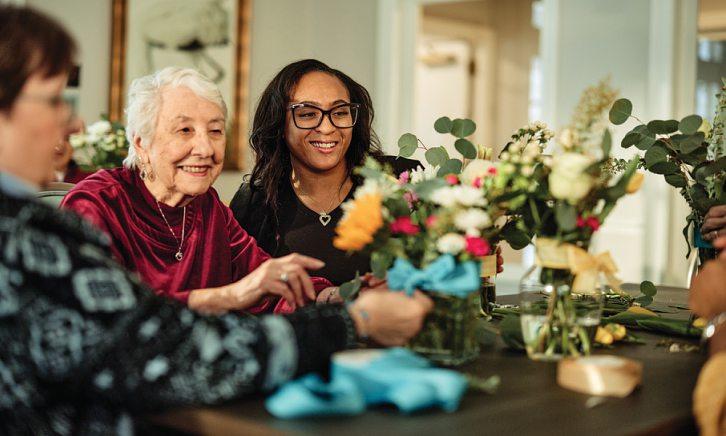


Benchmark communities, connections with friends, programs in which to learn newthings, and personalized support when needed all help seniors connecttowhat mattersmost. On average,our residentsexperience 19 daily interactions with our associates—momentsthat come together over chef-prepared meals in the dining room, during community concerts, in one of our spacious living areas or even just chatsinthe hallway



Dementiaisanumbrellaterm used to refertovarious illnesses,including Alzheimer’s disease. Dementia is asinisterillness that slowly steals away memories, cognitive function andeven personality. AccordingtoAlzheimer’s DiseaseInternational,asof2020 therewereanestimated 55 million people living with dementia around the world. That number is expected to rise to 139millionby2050. The organization reportsthatsomeone develops dementiaevery three seconds.
Alzheimer’sdisease canbechallenging forpatientsand their lovedones. Individualsmay wonder if thereare any controllable risk factorsthatcan help preventordelay the formationofthe disease. Although risk factorslikeage cannotbeavoided,there aresomecontrollableriskfactors forAlzheimer’s
That retiredMeridenProbate Judge,BRIAN T. MAHON,isaccepting newclients whoneedhelpin…
• ElderLaw Issues • TheProbating of Estates
• ThePreparation of Wills, Powers of Attorney andLivingWills/MedicalDirectives
PROTECTYOURSELFAND YOUR LOVED ONES
CALL BRIANTODAY (203-238-1010) or emailhim at brian.mahon@mqmlawyer.com
Thankyou to ourcommunity forvotingfor BrianMahon as your Readers’ Choice Best Estate PlanningAttorney

High bloodpressure, also knownas hypertension,isa significant risk factor for dementia,according to NYULangone Health. High bloodpressurecan damage thesmall blood vesselsinthe brain, leadingtoreduced blood flow andoxygendeprivation.Hypertensionalsomay triggerbrain inflammation,which cancontribute to cell damage andcognitive decline.
Research indicatesthattype2diabetes increasesa person’s risk of developing dementia, andisdependent on thelengthoftimesomeone hasdiabetesand howsevereitis, says the Alzheimer’sSociety.Diabetes, like hypertension, cancause damage to bloodvessels feeding nutrientsand oxygen to thebrain.
Smokingisatrickysubject when it comesto Alzheimer’sresearch. Areportpublished in the journalAlzheimer’s&DementiainJune2015 indicatedcigarette smokinghas been linked to both increasedand decreasedriskfor Alzheimer’s disease. However, thestudy’s findings indicated overall former/activesmoking is relatedtoa significantly increasedriskfor Alzheimer’sdisease becauseofthe relatedcerebraloxidative stress that facilitatesAlzheimer’sdisease formation.
TheAlzheimer’s Associationreports there appearstobealinkbetween Alzheimer’sand seriousheadtrauma, especially when an injury causes loss of consciousness. Taking stepstoavoid head injury maybeapreventivestepagainst Alzheimer’s.




Thereisacomplex relationship betweenalcohol andAlzheimer’s disease. BrightFocusFoundation reportsmoderatealcohol usemay accelerate Alzheimer’sdisease,while theAlzheimer’s Associationsaysrecentresearchpublished in thejournal Neuropsychiatric Diseasehas shown moderate drinking (two alcoholicdrinksper day) reducesone’s chancesofdevelopingAlzheimer’s, whileregular heavydrinkingcan increase the chancesby300 percent.
Managingseriousillnessesandmodifying lifestylechoicesmayhelpkeepAlzheimer’sdisease atbay.
After what feels like a lifetime in the workforce, retirement is a welcome change for many individuals. Upon retiring, people often engage in hobbies they may have previously relegated to the back burner. Travel opportunities increase in retirement, and retirees may live more relaxed and less stressful lives.
Stress stemming from a looming retirement can creep up for those people who have not taken the time to account for how their finances will change once they’re no longer working. Without a consistent salary or other income coming in, retirees may have to change their habits and spending accordingly. This is particularly true for those who did not sock away enough in retirement savings.
The key to enjoying retirement is creating a retirement budget and sticking to it Budgeting sets retirees up for more enjoyable golden years. The following are a few steps to creating a retirement budget.
• Add up all of your income. As retirement nears, it can be helpful to sit down with a financial professional and calculate all of the income streams that ultimately will be replacing your paycheck These include Social Security benefits, tax-advantaged retirement accounts like IRAs and 401(k)s, pensions, taxable investments, and even part-time earnings. This will give you a picture of projected income, which can be divided by the number of years you expect to spend in retirement
• Figure out your mandatory expenses Charles Schwab suggests considering the spending items that you will really need in retirement. These can include housing, utilities, clothing, medical insurance costs, and transportation. These needs may change through the years, so the budget can be reevaluated each year
• Calculate any discretionary expenses Spending that falls in the “want” territory may include travel, hobbies, gifting family members like grandchildren, and any big purchases like a boat or vacation timeshare.




Alzheimer’s disease is a progressive and debilitating condition that slowly robs a person of their memories and personality. Alzheimer’s disease is a form of dementia that produces various symptoms that occur in stages, ultimately arriving at a point when a person can no longer live independently due to cognitive decline.
The Fisher Center for Alzheimer’s Research Foundation says there are seven clinical stages of Alzheimer’s. Stages 1 through 3 are the pre-dementia stages, while stages 4 through 7 are the dementia stages Here is a close look at what these stages entail, according to the Global Deterioration Scale.
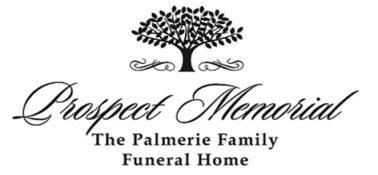


1
There is no cognitive decline, nor noticeable symptoms
2
A person may experience very mild cognitive decline. This can include one feeling like he or she is having memory lapses, but no symptoms of dementia can be detected by others, including medical professionals.
3 During stage 3, mild cognitive decline begins to become noticeable. Friends, family or coworkers begin to notice difficulties, which may include problems coming up with the right words or names; trouble remembering names; greater difficulty performing tasks; and losing or misplacing a valuable object
4 A careful medical interview should reveal symptoms of moderate cognitive decline. Forgetfulness of recent events; difficulty performing complex tasks like planning a meal for guests or paying bills; forgetfulness about one’s own personal history; and becoming moody or withdrawn are possible.
5 Cognitive decline continues to progress to where it
becomes moderately severe Gaps in memory are noticeable and individuals likely will need help with everyday activities Some may be unable to recall their addresses or telephone numbers, while others may be confused about the day or where they are. Stage 5 is usually the stage when a person can no longer live without assistance.
6
Very severe memory loss, loss of communication skills and inability to recognize loved ones occurs during the severe cognitive decline stage. One will need total care
7
This is the end-stage of the disease and is marked by profound cognitive impairment Loss of mobility and effective communication typically occurs at this stage.
It’s important to note that these stages are general guidelines of what can be expected as Alzheimer’s disease progresses Symptoms may vary among different people, and not everyone with Alzheimer’s will progress through these stages at the same rate
GIFTS FROM PAGE 3
Seniorsalsomay appreciate giftsthattouch theheart.Acustomrecipecutting boardthatfeaturesatreasured family recipe maybecomeacherished item.Acustomizedphoto calendar that features family members’ birthdaysand otherkey events also is thoughtful.Aphoto jewelrylocketmakes anicegiftfor aspecial senior woman.
Seniorstypically have more time to devote to travel than younger adults,and giftsthatcater to theirwanderlustare a perfect fit. DigitalGPS-based devicesthatconnect to keys or luggage canhelpprevent lost itemswhile traveling. Bright luggage thatwon’t getmixed up at thebaggage carousel or ergonomic neck pillowsthatfacilitatenapping on a flight also canbeappreciated.Those whoknowdestinationsthe seniorsintheir livesmay want to visitcan purchase planeorcruisetickets as agenerous gift forsomeone special.
Variouscategoriescan provideample inspirationwhenshopping forgifts forseniors this holidayseason.


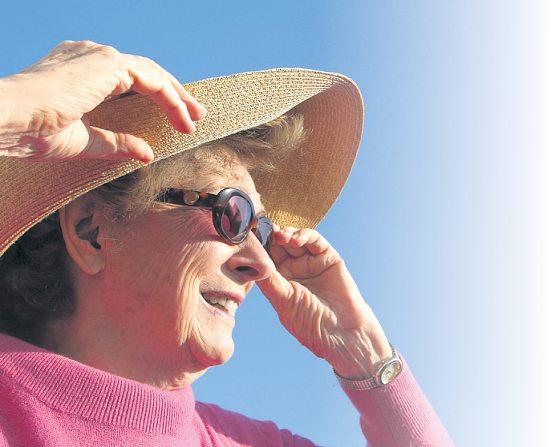

Physicalactivityisa valuable tool in the fightagainst chronic diseaseand other conditions.In fact, theCleveland Clinic highlights physical activity amongits nine ways to preventdisease in an efforttolive a long andrewarding life.
Children, adolescents, youngadults, andevenmen and womeninmiddleage maynot face toomanyphysicalhurdleswhentheytry to exercise,but seniorsare notalways so lucky. Agingmen andwomen with mobility issues may wonder if they canreapthe rewardsofphysicalactivity, andthankfullythere aremanywaystoexerciseevenif getting up andgoing isn’taseasyasitmight have been in years past.Sometimes referred to as “aerobic exercise” or simply “cardio,”cardiovascularexerciseisanumbrella term that encompassesawiderange of physical activities thatraise theheart rate andimprove endurance. Seniors
with mobility issues canlooktovarious formsofcardio for inspirationastheyseektobemorephysicallyactive withoutcompromisingtheir overallhealth.
•Walkyourway to ahealthier you. Walkingisaform of cardiovascular exercise that is idealfor olderadults with mobility issues becauseitneednot be physically demandingand it’s safe to walk just aboutanywhere. Walkinginaplace such as alocal park canbeparticularlygood for olderadultsbecause they cantakeperiodicbreakson benchesifaches,pains or stiffness is affecting theirability to keep moving
•Takeupswimming. Swimming mightbetailor-made forseniors with mobility issues becauseit’sagreat workout andexercisinginwater tendstobelesstaxingon musclesand joints.The ClevelandClinicnotes that swimming promotes hearthealth, strengthensthe lungs, helps to burn calories,and builds muscle,among otherbenefits Andmanyseniors find swimming is just as funintheir golden yearsasitwas in theiryouth,which meansaging adults mightnot face problems with motivation when the timecomes to getinthe pool
•Use an exercise bike or portable pedalexerciser Cyclingisawonderful exercise butone that seniorswith mobility issues mayfeelisnolongerpossible. If doctors adviseagainst riding atraditional bike,anexercisebikeor portable pedalexerciser canprovide many of thebenefits of cyclingwithout as greatariskfor accident or injury.A portable pedalexerciser canbecarried to apark, where seniorscan stillspend time in thegreat outdoors,which is oneofthe most appealingreasons to getona bike andgo.
•Takebeginneryogaortai chi. HelpGuide.orgnotes that gentle yoga or taichi canhelptoimprove flexibilityand reduce stress andanxiety.Thoughyogaand tai chican provideasmuchdemanding physical activity as individualsallow,beginnerclasses in each discipline don’t requiremuchmovement butdoprovide enough forseniors hoping to be less sedentary.
Even seniorswithmobilityissuescan find safe and effective ways to be more physically active.Prior to beginning anew exercise regimen, seniorswithmobilityissues areurged to discussactivitieswiththeir physicians
Especially forcaregiverswho want to ensure everything is done right, it’s easy to fall into thetrapofdoing everything yourself
“I didn’t trustother people to give my father care or understand him like Idid,” said Joni.“Butthatled to exhaustion,soI couldn’t be my best when we were together.”
Byassemblingacareteam, youcan consistently providethe assistanceyourlovedone needs. This mayinclude family members, neighbors,friends,community groups andother resources. Askyourloved one’shealthcareproviderabout resourcesinyourarea.
Anotherway to ensure extrasupport is throughComfort Keepers, which employsthousands of caregivers nationwide whodeliver joy throughinteractive caregiving by continuallycommunicating with, involvingand engaging with seniorsineverydaytasks andactivities, providing trustedrespite care when youneedit.
Whileyourlovedone relies on you, it’s crucialtotakecareof yourself. Find ways to supportyourown well-being,including getting restorativesleep,eatingwelland even just afew minutesofwalking but most importantly find time to simply do things youlove
“When Istopped doingthingsthatmademehappy,soI couldcare formymom,Igot easily irritatedbylittleannoyancesthatmight not have bothered me before,” addedBryan.“AfterIresumed my hobbies just once aweek, Ifeltmorepositive. Ineededto fill my cupsoIcould have thephysicaland mental strength to give to her.”
Self-caretakes many forms, so it’s vitaltolearn what’s importantfor you.Ask yourself what youneedtobring your best self to caregiving. This is even more importantwhenyou’rein the“sandwich generation” with kids at home
AComfort Keeperscaregiver canalsogiveyou peaceofmindthat yourlovedone is in good hands, openingopportunities to care for yourself andothersinyourfamilywho mayneedyou.
FIND MOMENTSOFJOY ANDGRATITUDE
As youspend time caring foryourloved one, notice thosemoments whenyou laughtogether, shareaspecial memory or just enjoyagood day when thesun is shining.
“Some days feel ordinary,thensomething breaks through: My dad tellsastory I’ve neverheard before,or smiles when thefamily’scat hopsonhis lap,”saidSaudia. “Those arethe momentsI’llremember.”
Caregiving forafamilymemberinvolvesacommitmentthat demonstrates love andasense of belongingthat’sfundamental to being human.
“Manycaregiverscallcaregivingablessing,”saidSnelling. “When people care foraging lovedones, they also getsomething back -deep emotionalrewards,personalgrowthand joy.”
ComfortKeepers understands thestruggles families face caring fora senior with Alzheimer’sdisease or dementia,especiallywhenyou’rehelping them live safely at home.ChoosingComfort Keepers, families receive supportincluding:
Speciallytrained caregivers
Family educationtobetterunderstanddementia
Tasksbuilt into theircareplanand geared to each senior’s intereststoengagethemphysically, mentally andemotionally
In-homeserviceslikepersonalcare, companionship, medication remindersand family respitecare
SafetyChoice®in-homesafetytechnologiesincluding medicalalert systemsand motion detectors
LearnmoreaboutcaringforyourlovedoneatComfortKeepers.com. CAREGIVER FROM PAGE 2
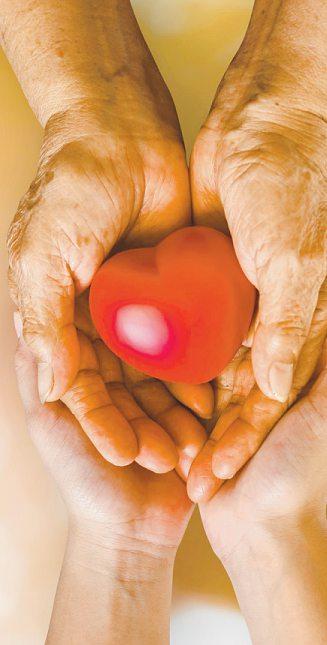

Providing compassionate,personalized careinthe Wallingford-Meriden area and surrounding towns for over 80 years.
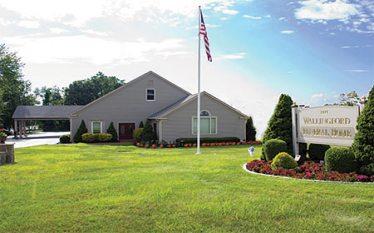
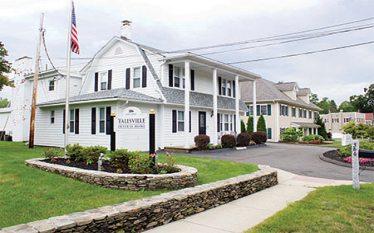

Wearen’t just an award-winning senior living provider.
We areMasonicare—Connecticut’s only completeand fully integrated senior carecontinuum.
Want to liveconfidently, knowing that no matter how your health or finances change, you’recovered?
At Masonicare, aging doesn’t mean slowing down. It means more.
More freedom. More connection. More joy.
Gone are the old stereotypes of “retirement homes”. Weare vibrantcommunities filled with energy, possibility, and purpose.
Wherechoice replaces limitation. Wherelaughter is heardoften. Wherefriendships grow, and living fully is not the exception— it’s the expectation.
ChoosingMasonicaremeans choosinga life of experiences,friendships, and longevity.

masonicare.org
Maintaining a sense of independence throughout retirement can inspire seniors to live their golden years to the fullest. For many seniors, nothing is more emblematic of their ability to stay independent than remaining in their homes. A number of variables can affect how long seniors stay in their homes, including the layout of the property and any potential safety threats that may arise as men and women age. Some small, safety-centric tweaks to a property can help men and women remain in their homes for as long as possible
• Increase lighting in bathrooms throughout the home Lighting is easily overlooked as a safety measure, but a well-lit space is easier to navigate. Increasing lighting in the bathroom and upgrading existing features to LED lighting can make it easier for seniors to navigate bathrooms at night. That’s a notable benefit, as seniors may need to make routine bathroom trips overnight.
• Install grab bars Grab bars are often found in public restrooms, but they’re equally useful in the bathrooms or private homes, particularly in seniors’ residences. Grab bars can be installed on both sides of all toilets and in the bathtub/shower stall so seniors can get up and down easily and reinforce their stability on wet surfaces
• Invest in bathroom storage systems. A cluttered bathroom is a potential safety hazard. Items in cluttered bathrooms can easily end up on the floor, and that goes for bathing items like shampoo and soap as well A bathroom storage system for a vanity and an organizer for bathing items inside a shower or tub can decrease the chance that items end up on the floor, where they can pose an injury risk for seniors who might struggle to bend over to pick them up or slip on fallen items when bathing.
• Renovate your existing shower Seniors whose current bathrooms house a traditional shower setup that requires them to step over a tub can renovate the space and replace that feature with a walk-in shower. A walk-in shower does not require seniors step over a bathtub, greatly reducing the risk of falls while bathing. Some additional shower renovations include installing a bench so seniors can sit down while bathing, ideally while using a hand-held shower head
• Purchase non-slip materials for the bathroom. Non-slip floor mats in a bathroom are essential for anyone, and especially beneficial for seniors. A non-slip vanity storage bin and toothbrush holder also can ensure daily accessories remain accessible
• Elevate toilet heights. Elevating toilet heights in bathrooms throughout the home can make it easier for seniors to sit down and get up when going to the bathroom. Toilets compliant with the Americans with Disabilities Act (ADA) are roughly 18 inches taller than standard toilets, which can make a big difference for seniors.
These are just a handful of ways seniors can make their bathrooms safer as they aspire to stay in their homes longer.
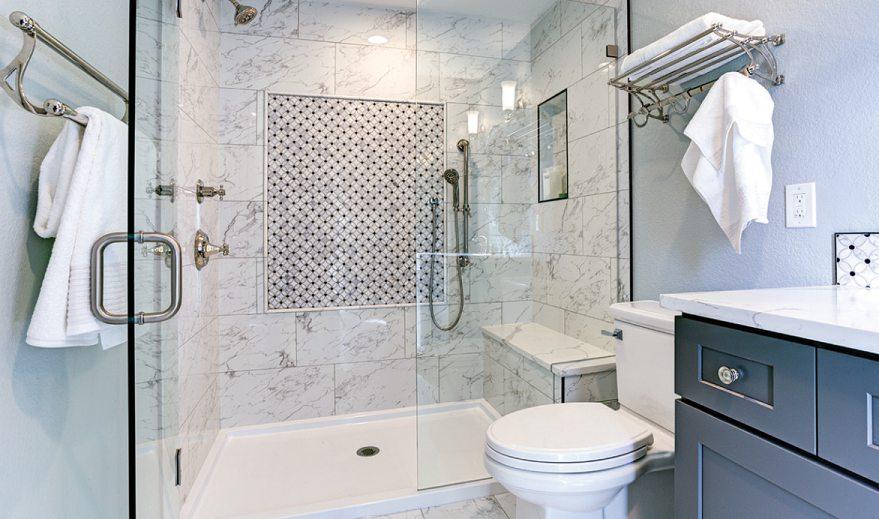
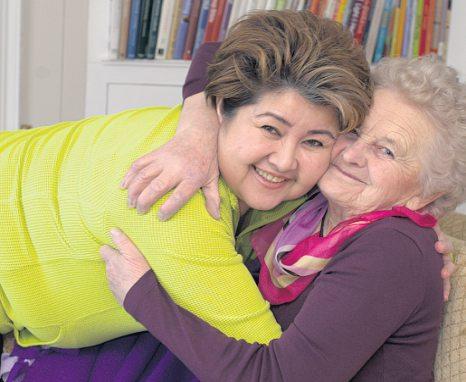


• Consider expenses that may go up. While certain expenses may go down, like commuting costs, grocery bills, and expenses related to children, bills for utilities, recreation, property taxes, and more likely will increase through the years.
• Compare projected income against projected expenses and see where the chips fall. If you find that income streams fall short, you may have to adjust investments before your retirement or you may have to take a part-time job after retirement Sometimes spouses may not be able to retire at the same time if one person’s salary will be needed to continue covering all expenses.
• Don’t overlook health care. Although you may be covered by Medicare and an insurance plan from a former employer, supplemental premiums and out-of-pocket costs may continue to rise during retirement According to the 2024 Fidelity Retiree Health Care Cost Estimate, on average, a 65-year-old person may need $165,000 in after-tax savings to cover health care expenses.
Retirement comes with exciting prospects, and careful budgeting for the days when you aren’t working can make for a more enjoyable post-work life

